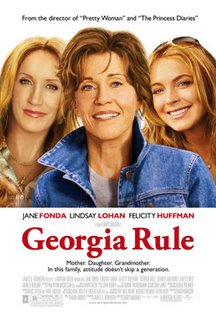
When you think of dramas that deal with topics such as child molestation, alcoholism and underage sex, filmmaker Garry Marshall is probably not the first name that pops in your head. This is a guy who has made a career off of making sweet, cloying films. I mean, the guy did a movie about a prostitute, and turned it into adorable romantic fluff back when he did
Pretty Woman.
Georgia Rule is the case of the wrong director put with the wrong material. His goofy blend of sweetness and good-hearted fun clashes with the dark and dramatic story elements at the core of the film, giving it an overall schizophrenic feel. Not sure if it wants to be a light-hearted romp or a serious look at a very dysfunctional family,
Georgia Rule never quite clicks because of its own uncertainness.
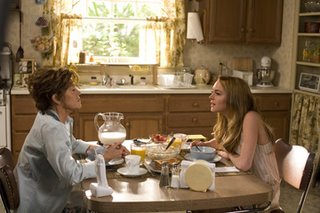
Troubled recent high school graduate Rachel (Lindsay Lohan) seems to be out of control. She drinks too much, parties too much, and when she crashes her car, her alcoholic mother Lilly (Felicity Huffman) has reached the end of her rope. She banishes Rachel to a small dusty town in Idaho that seems to have stepped right out of a 1950s sitcom. It's here that Rachel's grandmother, Georgia (Jane Fonda) lives. Georgia is a very strict yet kind woman who runs a very tight ship in her house and hates it when people take the Lord's name in vain, though she's not afraid to drop the "F-Bomb" herself when she's upset. Lilly obviously hopes that Georgia can straighten her daughter out, although we can plainly see that Lilly herself could use some help as well. Despite not being happy about being uprooted from everything and everyone she knows, Rachel tries to make the best out of her situation and befriends a tortured widowed veterinarian named Simon (Dermot Mulroney), and decides to teach the friendly teenage virgin, Harlan (Garrett Hedlund), all about sex. Tensions begin to mount between the three generations in Rachel's family when Rachel happens to mention that her stepfather Arnold (Cary Elwes) used to sexually molest her when she was 12. Old wounds are opened between the three women as they are forced to face their dark pasts that they would rather soon forget. Rachel's character and claim are brought into question when Arnold shows up in town to discredit her story, claiming that she is just looking for attention.
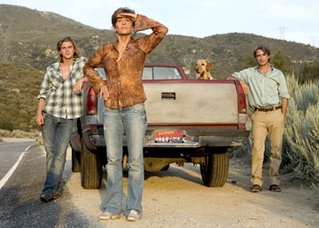
The ad campaign for
Georgia Rule would like you to believe that this is a sweet and fun romp perfect for Mother's Day about three generations of women coming together to bond. There's very little bonding in the film itself, as most of the women spend their time angry with each other or so drunk that they can barely stand up straight. Screenwriter Mark Andrus (
Divine Secrets of the Ya-Ya Sisterhood) seems to be trying to make a hard-hitting and realistic look at some very tough issues. But, for some reason, he keeps on betraying his own vision by throwing in goofy comedy. The film keeps on veering and switching in tone in almost every scene. We get some goofy comedy from the friendly down-home local folks in the small town, we get some raunch comedy as Rachel tries to teach her friend Harlan about sex and blow jobs, we get a lot of sentimental drama as Georgia and Lilly face their own past demons, and we get a mystery story that runs throughout that questions whether or not Rachel's claim about her stepfather is true or not. Maybe a skilled director could have successfully balanced this tricky material, but Garry Marshall is just the wrong guy to do it. Given the guy's past work, it's no surprise that the film is most at ease when it's being light and silly. When the story starts treading into darker territory, the movie explodes with over acting and ham-fisted dialogue and revelations that would be right at home in a made for TV movie on the Lifetime channel.
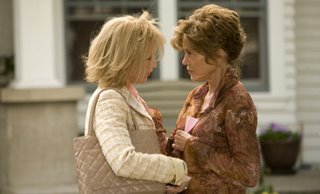
The uncertainness of the film itself seems to carry over into the screenplay, as it often seems to be not sure how we're supposed to react to these people. Lilly's alcoholism is sometimes passed off as comedic, and sometimes as tragic. It doesn't even seem to know whether we should trust Rachel's story or not. The movie confirms it, denies it, confirms it again, denies it again, and so on. It keeps on trying to make us guess and then pulling the rug out from under us that the whole thing starts to come across as being convoluted. The movie is at its best when the relationships are simple and genuine, instead of driven by melodrama or silliness. The relationship between Rachel and Simon the veterinarian is sweet and true, with the two forming an uneasy bond with each other both at work (Rachel takes a job as his receptionist) and in their personal lives. Even her relationship with the local boy Harlan has its moments, but it's brought down by a stupid goofy subplot where some local girls decide to spy on them and follow them around. The movie never quite gives the characters the chance to bond as closely as they should, which brings the film down. The relationship between Georgia and Rachel is not developed as strongly as it probably should be, since Georgia spends most of her scenes with Rachel's mother Lilly. We can see a lot of potential, but it's never acted upon.
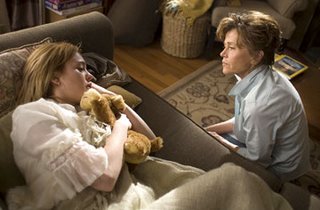
Most of this potential comes from the performers who fill the roles. Lindsey Lohan may not have the best public image, but there's no denying that she is a very strong actress. This movie received some unwanted publicity during its filming last summer, when the movie's producer sent out an open letter accusing Lohan of not showing up to work on time and delaying the production of the movie itself with her erratic behavior. The performance that she delivers as Rachel, however, proves that she definitely knows what she's doing when she does show up in front of the camera. She's believable in the role, and comes across as being sympathetic in a very natural way. Jane Fonda is good as well as the stern grandmother figure of the story. She wisely does not play the character as a know-it-all, as she has as many problems as the rest of the girls in the family, and she doesn't spend the entire film preaching or imparting wisdom to others. Of the three female leads, Felicity Huffman comes across as somewhat of the weak link in the chain. She's very good for most of her performance, but she can't help but go a little bit over the top during her scenes when she's supposed to be drunk. A little bit of reigning in could have easily fixed that problem. The most noteworthy performance in the film, however, belongs to Dermot Mulroney. He's quiet and likeable as Simon, and knows how to handle his character's grieving in a realistic and subtle way. There's no big "break down" moment for him, and he always keeps his performance in check so that it never steps into melodrama.

While the performances and some of the characters are sound,
Georgia Rule never quite comes across as strongly as it should. It's uncertain when it should be confident. I'm not sure if this is the fault of the screenplay itself, or if it is because Garry Marshall sometimes tries to slip some of his trademark sweet and goofy charm into a story that doesn't really need it. There are moments when you can see the movie it is trying to be, but then it goes off track.
Georgia Rule is not a terrible movie by any means. It's simply one suffering from an identity crisis.
0 comments
 When you think of dramas that deal with topics such as child molestation, alcoholism and underage sex, filmmaker Garry Marshall is probably not the first name that pops in your head. This is a guy who has made a career off of making sweet, cloying films. I mean, the guy did a movie about a prostitute, and turned it into adorable romantic fluff back when he did Pretty Woman. Georgia Rule is the case of the wrong director put with the wrong material. His goofy blend of sweetness and good-hearted fun clashes with the dark and dramatic story elements at the core of the film, giving it an overall schizophrenic feel. Not sure if it wants to be a light-hearted romp or a serious look at a very dysfunctional family, Georgia Rule never quite clicks because of its own uncertainness.
When you think of dramas that deal with topics such as child molestation, alcoholism and underage sex, filmmaker Garry Marshall is probably not the first name that pops in your head. This is a guy who has made a career off of making sweet, cloying films. I mean, the guy did a movie about a prostitute, and turned it into adorable romantic fluff back when he did Pretty Woman. Georgia Rule is the case of the wrong director put with the wrong material. His goofy blend of sweetness and good-hearted fun clashes with the dark and dramatic story elements at the core of the film, giving it an overall schizophrenic feel. Not sure if it wants to be a light-hearted romp or a serious look at a very dysfunctional family, Georgia Rule never quite clicks because of its own uncertainness. Troubled recent high school graduate Rachel (Lindsay Lohan) seems to be out of control. She drinks too much, parties too much, and when she crashes her car, her alcoholic mother Lilly (Felicity Huffman) has reached the end of her rope. She banishes Rachel to a small dusty town in Idaho that seems to have stepped right out of a 1950s sitcom. It's here that Rachel's grandmother, Georgia (Jane Fonda) lives. Georgia is a very strict yet kind woman who runs a very tight ship in her house and hates it when people take the Lord's name in vain, though she's not afraid to drop the "F-Bomb" herself when she's upset. Lilly obviously hopes that Georgia can straighten her daughter out, although we can plainly see that Lilly herself could use some help as well. Despite not being happy about being uprooted from everything and everyone she knows, Rachel tries to make the best out of her situation and befriends a tortured widowed veterinarian named Simon (Dermot Mulroney), and decides to teach the friendly teenage virgin, Harlan (Garrett Hedlund), all about sex. Tensions begin to mount between the three generations in Rachel's family when Rachel happens to mention that her stepfather Arnold (Cary Elwes) used to sexually molest her when she was 12. Old wounds are opened between the three women as they are forced to face their dark pasts that they would rather soon forget. Rachel's character and claim are brought into question when Arnold shows up in town to discredit her story, claiming that she is just looking for attention.
Troubled recent high school graduate Rachel (Lindsay Lohan) seems to be out of control. She drinks too much, parties too much, and when she crashes her car, her alcoholic mother Lilly (Felicity Huffman) has reached the end of her rope. She banishes Rachel to a small dusty town in Idaho that seems to have stepped right out of a 1950s sitcom. It's here that Rachel's grandmother, Georgia (Jane Fonda) lives. Georgia is a very strict yet kind woman who runs a very tight ship in her house and hates it when people take the Lord's name in vain, though she's not afraid to drop the "F-Bomb" herself when she's upset. Lilly obviously hopes that Georgia can straighten her daughter out, although we can plainly see that Lilly herself could use some help as well. Despite not being happy about being uprooted from everything and everyone she knows, Rachel tries to make the best out of her situation and befriends a tortured widowed veterinarian named Simon (Dermot Mulroney), and decides to teach the friendly teenage virgin, Harlan (Garrett Hedlund), all about sex. Tensions begin to mount between the three generations in Rachel's family when Rachel happens to mention that her stepfather Arnold (Cary Elwes) used to sexually molest her when she was 12. Old wounds are opened between the three women as they are forced to face their dark pasts that they would rather soon forget. Rachel's character and claim are brought into question when Arnold shows up in town to discredit her story, claiming that she is just looking for attention. The ad campaign for Georgia Rule would like you to believe that this is a sweet and fun romp perfect for Mother's Day about three generations of women coming together to bond. There's very little bonding in the film itself, as most of the women spend their time angry with each other or so drunk that they can barely stand up straight. Screenwriter Mark Andrus (Divine Secrets of the Ya-Ya Sisterhood) seems to be trying to make a hard-hitting and realistic look at some very tough issues. But, for some reason, he keeps on betraying his own vision by throwing in goofy comedy. The film keeps on veering and switching in tone in almost every scene. We get some goofy comedy from the friendly down-home local folks in the small town, we get some raunch comedy as Rachel tries to teach her friend Harlan about sex and blow jobs, we get a lot of sentimental drama as Georgia and Lilly face their own past demons, and we get a mystery story that runs throughout that questions whether or not Rachel's claim about her stepfather is true or not. Maybe a skilled director could have successfully balanced this tricky material, but Garry Marshall is just the wrong guy to do it. Given the guy's past work, it's no surprise that the film is most at ease when it's being light and silly. When the story starts treading into darker territory, the movie explodes with over acting and ham-fisted dialogue and revelations that would be right at home in a made for TV movie on the Lifetime channel.
The ad campaign for Georgia Rule would like you to believe that this is a sweet and fun romp perfect for Mother's Day about three generations of women coming together to bond. There's very little bonding in the film itself, as most of the women spend their time angry with each other or so drunk that they can barely stand up straight. Screenwriter Mark Andrus (Divine Secrets of the Ya-Ya Sisterhood) seems to be trying to make a hard-hitting and realistic look at some very tough issues. But, for some reason, he keeps on betraying his own vision by throwing in goofy comedy. The film keeps on veering and switching in tone in almost every scene. We get some goofy comedy from the friendly down-home local folks in the small town, we get some raunch comedy as Rachel tries to teach her friend Harlan about sex and blow jobs, we get a lot of sentimental drama as Georgia and Lilly face their own past demons, and we get a mystery story that runs throughout that questions whether or not Rachel's claim about her stepfather is true or not. Maybe a skilled director could have successfully balanced this tricky material, but Garry Marshall is just the wrong guy to do it. Given the guy's past work, it's no surprise that the film is most at ease when it's being light and silly. When the story starts treading into darker territory, the movie explodes with over acting and ham-fisted dialogue and revelations that would be right at home in a made for TV movie on the Lifetime channel. The uncertainness of the film itself seems to carry over into the screenplay, as it often seems to be not sure how we're supposed to react to these people. Lilly's alcoholism is sometimes passed off as comedic, and sometimes as tragic. It doesn't even seem to know whether we should trust Rachel's story or not. The movie confirms it, denies it, confirms it again, denies it again, and so on. It keeps on trying to make us guess and then pulling the rug out from under us that the whole thing starts to come across as being convoluted. The movie is at its best when the relationships are simple and genuine, instead of driven by melodrama or silliness. The relationship between Rachel and Simon the veterinarian is sweet and true, with the two forming an uneasy bond with each other both at work (Rachel takes a job as his receptionist) and in their personal lives. Even her relationship with the local boy Harlan has its moments, but it's brought down by a stupid goofy subplot where some local girls decide to spy on them and follow them around. The movie never quite gives the characters the chance to bond as closely as they should, which brings the film down. The relationship between Georgia and Rachel is not developed as strongly as it probably should be, since Georgia spends most of her scenes with Rachel's mother Lilly. We can see a lot of potential, but it's never acted upon.
The uncertainness of the film itself seems to carry over into the screenplay, as it often seems to be not sure how we're supposed to react to these people. Lilly's alcoholism is sometimes passed off as comedic, and sometimes as tragic. It doesn't even seem to know whether we should trust Rachel's story or not. The movie confirms it, denies it, confirms it again, denies it again, and so on. It keeps on trying to make us guess and then pulling the rug out from under us that the whole thing starts to come across as being convoluted. The movie is at its best when the relationships are simple and genuine, instead of driven by melodrama or silliness. The relationship between Rachel and Simon the veterinarian is sweet and true, with the two forming an uneasy bond with each other both at work (Rachel takes a job as his receptionist) and in their personal lives. Even her relationship with the local boy Harlan has its moments, but it's brought down by a stupid goofy subplot where some local girls decide to spy on them and follow them around. The movie never quite gives the characters the chance to bond as closely as they should, which brings the film down. The relationship between Georgia and Rachel is not developed as strongly as it probably should be, since Georgia spends most of her scenes with Rachel's mother Lilly. We can see a lot of potential, but it's never acted upon. Most of this potential comes from the performers who fill the roles. Lindsey Lohan may not have the best public image, but there's no denying that she is a very strong actress. This movie received some unwanted publicity during its filming last summer, when the movie's producer sent out an open letter accusing Lohan of not showing up to work on time and delaying the production of the movie itself with her erratic behavior. The performance that she delivers as Rachel, however, proves that she definitely knows what she's doing when she does show up in front of the camera. She's believable in the role, and comes across as being sympathetic in a very natural way. Jane Fonda is good as well as the stern grandmother figure of the story. She wisely does not play the character as a know-it-all, as she has as many problems as the rest of the girls in the family, and she doesn't spend the entire film preaching or imparting wisdom to others. Of the three female leads, Felicity Huffman comes across as somewhat of the weak link in the chain. She's very good for most of her performance, but she can't help but go a little bit over the top during her scenes when she's supposed to be drunk. A little bit of reigning in could have easily fixed that problem. The most noteworthy performance in the film, however, belongs to Dermot Mulroney. He's quiet and likeable as Simon, and knows how to handle his character's grieving in a realistic and subtle way. There's no big "break down" moment for him, and he always keeps his performance in check so that it never steps into melodrama.
Most of this potential comes from the performers who fill the roles. Lindsey Lohan may not have the best public image, but there's no denying that she is a very strong actress. This movie received some unwanted publicity during its filming last summer, when the movie's producer sent out an open letter accusing Lohan of not showing up to work on time and delaying the production of the movie itself with her erratic behavior. The performance that she delivers as Rachel, however, proves that she definitely knows what she's doing when she does show up in front of the camera. She's believable in the role, and comes across as being sympathetic in a very natural way. Jane Fonda is good as well as the stern grandmother figure of the story. She wisely does not play the character as a know-it-all, as she has as many problems as the rest of the girls in the family, and she doesn't spend the entire film preaching or imparting wisdom to others. Of the three female leads, Felicity Huffman comes across as somewhat of the weak link in the chain. She's very good for most of her performance, but she can't help but go a little bit over the top during her scenes when she's supposed to be drunk. A little bit of reigning in could have easily fixed that problem. The most noteworthy performance in the film, however, belongs to Dermot Mulroney. He's quiet and likeable as Simon, and knows how to handle his character's grieving in a realistic and subtle way. There's no big "break down" moment for him, and he always keeps his performance in check so that it never steps into melodrama. While the performances and some of the characters are sound, Georgia Rule never quite comes across as strongly as it should. It's uncertain when it should be confident. I'm not sure if this is the fault of the screenplay itself, or if it is because Garry Marshall sometimes tries to slip some of his trademark sweet and goofy charm into a story that doesn't really need it. There are moments when you can see the movie it is trying to be, but then it goes off track. Georgia Rule is not a terrible movie by any means. It's simply one suffering from an identity crisis.
While the performances and some of the characters are sound, Georgia Rule never quite comes across as strongly as it should. It's uncertain when it should be confident. I'm not sure if this is the fault of the screenplay itself, or if it is because Garry Marshall sometimes tries to slip some of his trademark sweet and goofy charm into a story that doesn't really need it. There are moments when you can see the movie it is trying to be, but then it goes off track. Georgia Rule is not a terrible movie by any means. It's simply one suffering from an identity crisis.






0 Comments:
Post a Comment
<< Home